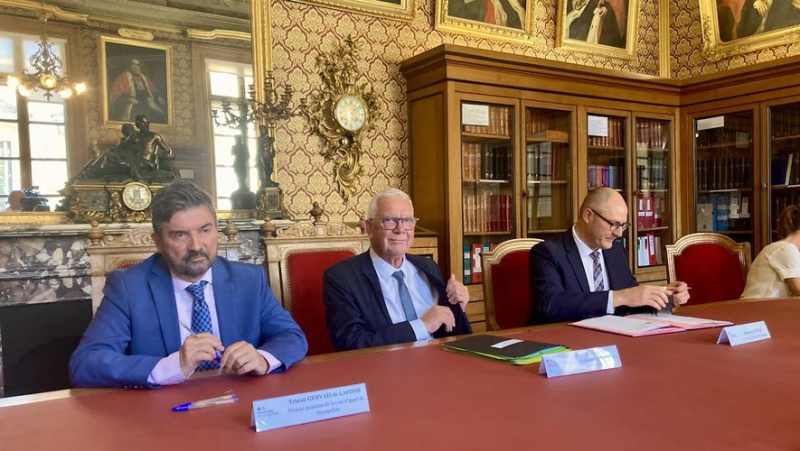Bringing perpetrators and victims of attacks into dialogue: the Montpellier Court of Appeal, a pioneer in France in restorative justice

The first president of the Montpellier Court of Appeal and the Attorney General initialed the agreement with all the partners. – F.A.
The Montpellier Court of Appeal is the first in France to commit entirely to the practice of restorative justice. A practice which consists, with the aim of appeasement, of bringing together detainees or convicts on one side, and victims on the other.
In 2016, the Hérault department was a pioneer in the implementation of restorative justice. This practice consists of bringing perpetrators and victims of attacks into dialogue, with the aim of appeasement. The objective is to make those first aware of the harm they may have done and to prevent the risk of recurrence. And for the latter, to verbalize the repercussions of these actions on their lives, in order to achieve better well-being. Today, the Montpellier Court of Appeal is the first in France to fully commit to this approach, in the four departments within its jurisdiction: Hérault, Aude, Pyrénées Orientales and Aveyron.
Now applied to minors
Tuesday June 4, this commitment was concretized by the signing of an agreement which brings together all the partners. Around the first president of the Court of Appeal of Montpellier, Tristan Gervais de Lafond, and the attorney general, Jean-Marie Beney, were present the association France Victimes 34, the penitentiary service of integration and of probation (Spip), the directors of the prison centers of Villeneuve-lès-Maguelone and Béziers, the interregional directorate of penitentiary services and for the first time in this type of partnership, the directorate of judicial youth protection (PJJ) .
Indeed, since 2021, restorative justice has been integrated into the Juvenile Criminal Justice Code. "For children in construction, it can help them understand the harm they have caused", underlines Nicolas Ginoux , territorial director of the PJJ. In 2021, the legal framework for restorative justice has also evolved by applying to cases of sexual assault for which the facts are prescribed. Note that professors and law students make their contribution by evaluating the actions carried out. Anne Ponseille, vice-president of France Victime 34 and lecturer at the Faculty of Montpellier was also present during this signing.
Assault, sexual violence, domestic violence
In Hérault, the meetings organized so far concern cases of intentional violence (assault, robbery…), sexual violence, and by the end of the year, domestic violence . So many circumstances which can provoke deep emotions, hence the very strict supervision of these meetings, with preparation in advance, support during the exchanges and the clinical supervision of psychologists for the facilitators of the exchanges. . "We are here to ensure the security environment", indicates Emilie Morin, deputy director of Spip 34. "Restorative justice requires a strong commitment from a financial point of view. Quality work takes time and requires training,” emphasizes Roselyne Leplant-Duplouy, president of France Victimes 34.
Six sessions have been organized to date in Hérault, in the remand centers of Villeneuve-lès-Maguelone and Béziers and within the support structure towards the exit (SAS) of Montpellier. It accommodates prisoners at the end of their sentences or serving sentences of less than one year. The meetings are thematic, around a type of offense, and bring together three or four perpetrators and as many victims. They are organized over five weeks, in 3-hour sessions.
A conference on restorative justice will be organized in Montpellier on October 8.
A right offered to victims
The participants, perpetrators and victims, are identified jointly by the prison integration and probation service and the France Victimes 34 association. "We have included restorative justice in the rights we present to victims, but we have a lot of difficulty in doing so. find some. As for the authors, we ensure à This means that they do not come with the aim of obtaining a reduction in sentence", indicates Jos&phine Cesbron, director of France Victimes 34 In any case, participation à a restorative justice session does not in any way influence the legal procedure. "But the information can be communicated “e to the sentence enforcement judge”, specifies Sylvie Boge, advisor to the sentence enforcement judge. the Court of Appeal and Reference for Restorative Justice.
I subscribe to read more




